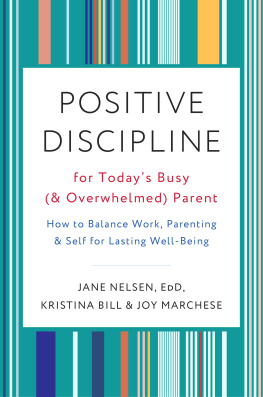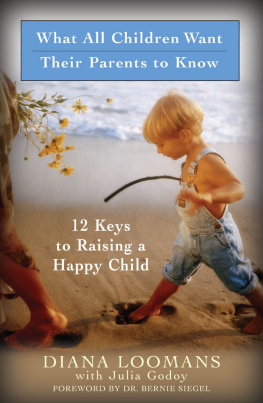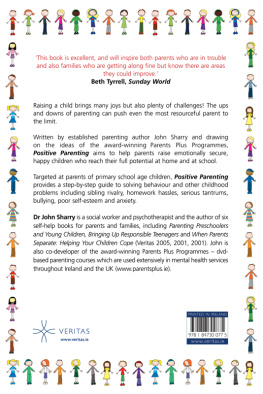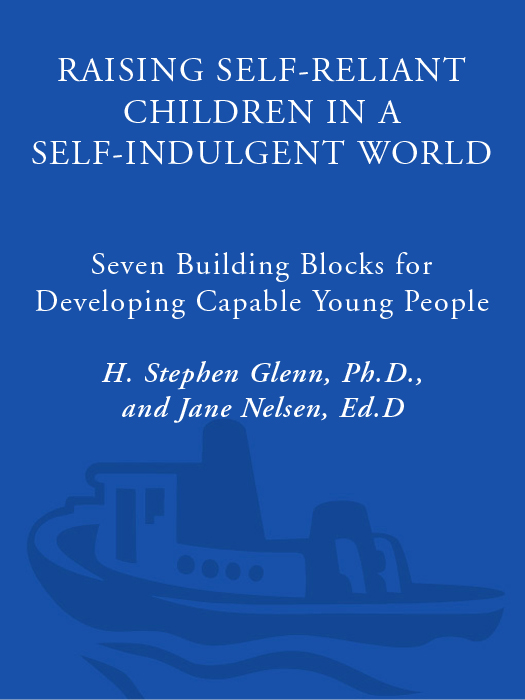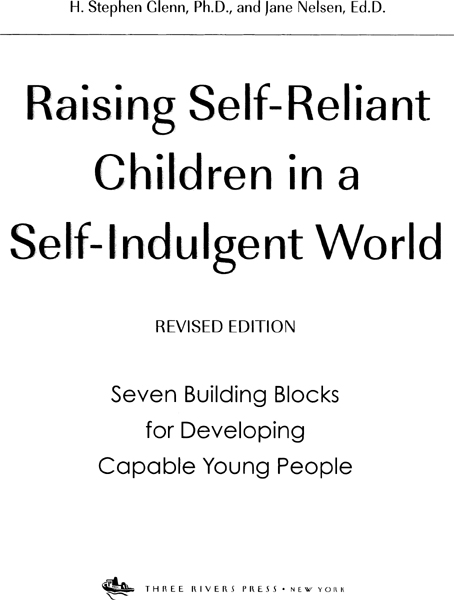Our understanding of this topic has been greatly heightened and enhanced by thousands of people over the last twenty years who have shared with us their personal struggles and their personal successes in the hope that they would increase peoples understanding of families in our changing world.
I, Stephen Glenn, would like first to acknowledge my parents, Harold and Helen Glenn, whose more than sixty years of marriage have provided a great model. Next, I would like to thank my four children, Keri Marie, Kristi Lyn, Kimbi Lee, and Michael who have raised a fairly capable father and have been willing to help me go through the trial and error process in learning to be one.
I would also like to acknowledge Dale and Rita Miller, who have spent nearly sixty years together raising my wife Judy Arleen. And to Judyshe has brought me Jennifer, John and Becky to help raise and is sharing the experience of our twelve grandchildren with me.
Finally, I would like to acknowledge Jane Nelsen, who challenged me to sit down and record the many thoughts and ideas spoken in my workshops and speeches over the years. Without her discipline this book might never have been written.
I, Jane Nelsen, would like to acknowledge the inspiration Stephen has been in my life as in so many others lives. The principles presented in this book have been extremely helpful in our family. It is a privilege to be instrumental in making this material available in book form.
Special appreciation goes to Barry, Mark, and Mary for their patience, support, and self-reliance during this project and in general. They are extremely capable people.
We deeply appreciate our Prima editors, Shawn Vreeland and Jamie Miller, for their patience and encouragementand Paula Gray for making the book more fun to read with her fabulous illustrations.
INTRODUCTION
The Challenge That Faces Us
THE PROCESS OF GROWING from weak to strong, from dependent to independent, from incapable to capable is called habilitation.
Steve spent eight years in higher education studying rehabilitation, and never in all those years was the concept of habilitation discussed. It was his young daughter who really challenged him with the idea. She was learning about dictionaries and wanted to help him with a paper he was working on, so he asked her to look up rehabilitation. The definition she found was to restore to former excellence.
Steve began to laugh. His daughter asked, Whats so funny, Dad?
He replied, I was just thinking about all my clients. Its hard for me to believe that every struggling adolescent was once an excellent individual who forgot how to be excellent, or that every struggling alcoholic was once an excellent recovering alcoholic and gave it up for some unknown reason. I cant believe that every chronically inadequate family was once an excellent family that lost sight of its goals. It is my impression that virtually all the people Ive served in my career have been struggling to attain something that had never been within reach for them before.
She said, Well, Dad, didnt you always tell me that when you look up a word with re-in front of it that its very helpful to look up the word without the re-to see what it is you are redoing?
Yes, thats what I usually do.
Well, then, she said, we should look up habilitation.
They couldnt find the word habilitation in their Websters Dictionary at home, so they went to the library to search the larger dictionary there. Its here! she cried in excitement when they came upon the word.
The definition given for habilitation was to clothe. That didnt ring a bell, so they looked up the reference that was given, which led them to a chart showing the evolution of the human race. On the chart was a series of figures beginning with apes moving along to increasingly upright primates and ending with a man in a three-piece suit with a briefcase. The first figures were naked and hairy, but in the middle of the chart one was dressed in fur jogging shorts. After that, the figures were fully clothed. The first fully clothed figure was labeled Homo habilus, translated as man the able or the capable. From the root word habilus we get ability or capability. The first alleged progenitor of the human race who acquired capabilities to act on the environment rather than react to it was called human the able or capable. Capabilities distinguished humans from animals.
With this definition in hand, Steves daughter, with marvelous childlike logic, said, Then arent you trying to do something that was never done in the first place?
Steve said with a smile, Where were you about $30 billion worth of federal programs ago with that kind of logic and insight? He was referring to the many organizations and institutions that for years have tried to rehabilitateto restore to former excellencepeople who were never habilitated in the first place.
Most people in rehabilitation programs have never been capable, productive, or independent. In reality, they do not need rehabilitation. They need habilitation.
Human beings arrive in this world without capabilities and have to acquire them in an apprenticeship. Websters helps again here by defining apprentice as one who is learning by practical experience under skilled workers.
The last half of the twentieth century saw massive changes in American Society, many of which undercut the ability of many families to provide opportunities for young people to engage in an apprenticeship of habilitation to prepare them for life. For our forebears, most of whom lived in rural environments, life proceeded at a relatively slow pace. They had time to adapt to external changes. But today we are caught in a vortex of technological and societal change that is whirling ever faster. Instead of the stability and familiarity our grandparents knew, we are faced with the need to adapt to constantly changing conditions. Americans, like people of many other nations, are crossing a frontier of knowledge and technology expanding at a rate unprecedented in history. Nowhere is the stress of that journey more evident than among families and young people.
Declining Achievement, Motivation, and Discipline
THE STEADILY EMERGING BASE of statistical evidence in the United States indicates that beginning with the children born in 1946, the baby boomers who became the class of 63, achievement began a steady downward trend that persisted over the next twenty years. That wonderful flock of postwar children, born to high hopes in 1946, struggled to reach their potential. They took the achievement tests in 1963 and became the first group of children in one hundred years to move significantly


